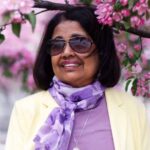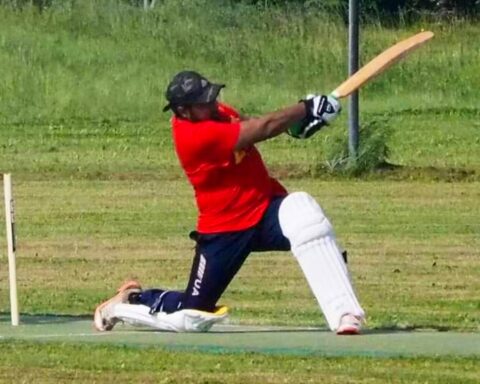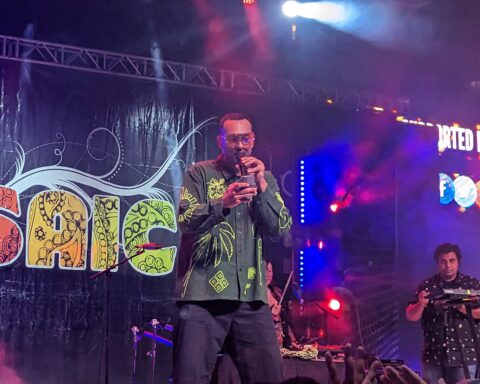Press freedom is not only suppressed by authoritarian governments, but is also restricted by Western ones, says Canadian-born, Pakistan-based Kathy Gannon, special regional correspondent for Pakistan and Afghanistan with the Associated Press (AP).
A resident of Islamabad, Pakistan for over 20 years, she was in Ottawa to receive the World Press Freedom Award for 2015 and deliver the keynote address at a luncheon celebrating May 3, the UNESCO-designated World Press Freedom Day.
“In principle, press freedom is widely accepted; in practice, not so much.”
The awards are presented annually by the Ottawa-based Canadian Committee for World Press Freedom and the Canadian Commission for UNESCO to honour a journalist or media worker who has made a significant contribution to press freedom in the last 15 months.
Gannon and her German photographer-colleague Anja Niedringhaus were attacked with a hail of gunfire by an Afghan police commander on April 4, 2014 while they were in the country to cover its elections. Niedringhaus was instantly killed, and Gannon was severely wounded.
“Press Freedom – Fact or Fiction?”
In her speech entitled “Press Freedom – Fact or Fiction?” Gannon said: “In principle, press freedom is widely accepted; in practice, not so much.”
Gannon said that governments, including those that claim to be champions of freedom, try to “stage-manage” the press, in an effort, for example, to downplay the consequences of war.
She revealed that it had happened to her while she was covering the Afghanistan war, and continues to happen. She cited several examples. The U.S. government placed restrictions on taking pictures of wounded soldiers and forbade the reporting of incidents when there were no fatalities.
These limits are placed on the press in the name of patriotism and national security, she pointed out.
She also had words of criticism for Western journalists who, she said, have “a lot of soul-searching to do.” She went on to say that reporters from the Western world often pursue their profession “as if we have the monopoly of all things that are good and right,” are lazy and uncritical of their government’s stance, and do not ask enough questions.
Illustrating the serious consequences of such one-sided reporting, she said that the U.S. decision to go to war with Iraq was influenced by a series of New York Times articles based on the word of a single source, an Iraqi opposition politician who wanted to get rid of Saddam Hussein.
She added that the same good-versus-evil mentality underpins Western reporting of the ISIS conflict.
Gannon, who is still undergoing therapy for the wounds she sustained in the attack last April, says she loves the people of Pakistan and Afghanistan. She remains committed to her journalistic calling and hopes to return to work in October.
[Gannon] said that even as a child she was fascinated by other places and people and thought everything in the outside world, which she came to know through books, news programs and documentaries, was “wonderful.”
In an interview with New Canadian Media before the World Press Freedom Day celebration, Gannon said she has no feelings of enmity or bitterness towards the Afghan people just because of the actions of one gunman, who first said in court that he was seeking revenge for the deaths of his family members in a NATO bombing, and then retracted his story.
She said many Afghan friends called to apologize for the horrific incident; she even had a call from then-Afghanistan president Hamid Karzai.
From Timmins to Islamabad
Tracing her career path — which took her from Timmins, a small, isolated town in Northern Ontario with a population of approximately 43,000 where she was born and raised — to Islamabad, Pakistan, she outlined a story that began, as usual, with childhood dreams.
She said that even as a child she was fascinated by other places and people and thought everything in the outside world, which she came to know through books, news programs and documentaries, was “wonderful.” She dreamed of travelling to other parts of the world, but first she worked her way across Canada, reporting for small newspapers across the country.
“I felt very welcome in Pakistan and live my life there without pretending to be anyone else.”
“I always wanted to be a foreign correspondent, but I knew the route to that through Canadian newspapers would be a long and difficult one,” she recalled, explaining that there is such a small number of major dailies in Canada and very few had overseas bureaus with large numbers of employees.
Always adventurous and curious, she made her travel dreams come true when she and a photographer friend travelled and worked their way across the world, living in places such as South Lebanon, Tokyo and Peshawar.
While living in Peshawar in the 1980s, she worked as a stringer for the Associated Press. Her big break came in 1988, when the number-two AP correspondent in Islamabad resigned, and she was offered the position. She immediately accepted and moved to Islamabad.
A Canadian in Pakistan
“I’ve never had a problem adapting to life there,” she said. “I felt very welcome in Pakistan and live my life there without pretending to be anyone else.” She explained that, while embracing the culture of what has become her adopted homeland, she has remained true to her Canadian roots. She dresses more or less as she would in Canada, and does not feel the need to wear a hijab or burqa, except on some occasions when she drapes a scarf lightly over her head.
She is married to Naeem Pasha, a Pakistani architect who owns an art gallery in Islamabad called Rohtas, which showcases the work of some of the most prominent contemporary Pakistani and foreign artists. She speaks Urdu fairly fluently, but says she is still working on improving her language skills.
Gannon insists that, contrary to the perceptions of many people in the Western world who talk about “cultural differences,” the people of Pakistan and Afghanistan are just the same as people anywhere.
She was one of the few Western reporters permitted to work in Kabul when the Taliban were in power.
Kathy has been working in this area for almost 25 years now. Gannon’s husband told CBC News in an interview shortly after the shooting incident last year: “It’s like she knows everybody in Afghanistan, and if you asked her, she could rattle off names from one end of the country to the other.”
Ottawa-based writer/journalist, editor, blogger, communications professional seeking freelance opportunities in political and travel writing.





